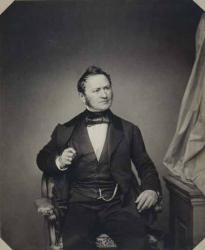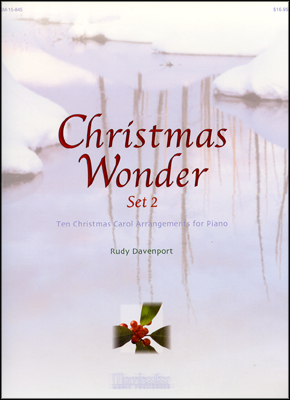- |
User Links
Lasst uns anbeten
Herbei, o ihr Gläubigen, fröhlich triumphieret
Author: John Francis Wade; Translator: Friedrich Heinrich Ranke (1823)Tune: ADESTE FIDELES
Published in 49 hymnals
Representative Text
1 Herbei, o ihr Gläub’gen,
fröhlich triumphieret,
o kommet, o kommet nach Bethlehem!
Sehet das Kindlein, uns zum Heil geboren!
O lasset uns anbeten,
o lasset uns anbeten,
o lasset uns anbeten den König!
[O come, all ye faithful, joyful and triumphant,
O come ye, O come ye to Bethlehem;
come and behold him born, the King of angels;
O come, let us adore him,
O come, let us adore him,
O come, let us adore him, Christ, the Lord.]
2 Du König der Ehren, Herrscher der Heerscharen,
verschmähst nicht zu ruhen in Marien Schoß,
Gott, wahrer Gott von Ewigkeit geboren.
O lasset uns anbeten,
O lasset uns anbeten,
O lasset uns anbeten den König!
3 Kommt, singet dem Herren, singt, ihr Engelchöre!
Frohlocket, frohlocket, ihr Seligen:
"Ehre sei Gott im Himmel und auf Erden!"
O lasset uns anbeten,
O lasset uns anbeten,
O lasset uns anbeten den König!
4 Ja, dir, der du heute Mensch für uns geboren,
Herr Jesu, sei Ehre und Preis und Ruhm,
dir, fleischgewordnes Wort des ewgen Vaters!
O lasset uns anbeten,
O lasset uns anbeten,
O lasset uns anbeten den König!
Author: John Francis Wade
John Francis Wade (b. England, c. 1711; d. Douay, France, 1786) is now generally recognized as both author and composer of the hymn "Adeste fideles," originally written in Latin in four stanzas. The earliest manuscript signed by Wade is dated about 1743. By the early nineteenth century, however, four additional stanzas had been added by other writers. A Roman Catholic, Wade apparently moved to France because of discrimination against Roman Catholics in eighteenth-century England—especially so after the Jacobite Rebellion of 1745. He taught music at an English college in Douay and hand copied and sold chant music for use in the chapels of wealthy families. Wade's copied manuscripts were published as Cantus Diversi pro Dominicis et Festis p… Go to person page >Translator: Friedrich Heinrich Ranke
 German Protestant theologian. Author of a number of hymns, two of which are still in general use:
*Tochter Zion, freue dich, sung to the tune MACCABAEUS
*Herbei, o ihr Gläubigen, a translation of "Adeste fideles"
He also pubished a translation of Bunyan's Pilgrim's Progress and a two-volume study on the Pentateuch. Go to person page >
German Protestant theologian. Author of a number of hymns, two of which are still in general use:
*Tochter Zion, freue dich, sung to the tune MACCABAEUS
*Herbei, o ihr Gläubigen, a translation of "Adeste fideles"
He also pubished a translation of Bunyan's Pilgrim's Progress and a two-volume study on the Pentateuch. Go to person page >Text Information
| First Line: | Herbei, o ihr Gläubigen, fröhlich triumphieret |
| Title: | Lasst uns anbeten |
| Latin Title: | Adeste Fideles |
| Author: | John Francis Wade |
| Translator: | Friedrich Heinrich Ranke (1823) |
| Language: | German |
| Refrain First Line: | O lasset uns anbeten |
| Copyright: | Public Domain |
English
German
- 349 Lieder: für Schule und Haus in den Vereinigten Staaten insbesondere für die Elementar- und Mittelclassen in den Stadtschulen, sowie für die Parochialschulen auf dem Lande #143
- Antwort Finden in alten und neuen Liedern, in Worten zum Nachdenken und Beten: evangelisches Gesangbuch (Bayern, Mitteldeutschland, Thüringen) #45
- Das geistliche Volkslied: Sammlung geistlicher Lieder für außergottesdienstliche Kreise in vierstimmigem Satze, zugleich asl Begleiterin der "Kleine Missionsharfe" (10. Auflage) #18
- Deutsches Liederbuch: Sammlung von Chorälen und Liedern für Schule und Haus #146
- Evangelischer Liederschatz: eine Auswahl der bekanntesten Kernlieder für Sonntags-Schule, Vereine und Gottesdienste (2. Auflage) #79
- Evangelisches Kirchengesangbuch: Ausgabe für die Landeskirchen Rheinland, Westfalen und Lippe #482
- Evangelisches Liederbuch fuer Gemeinde-Schule-Haus #d35
- Frohe Lieder und Brüder-Harfe: eine Sammlung von Liedern für Sonntagschulen und Jugendvereine (Spezialle Aufl.) #163
- Fröhliche Weihnacht: 84 der schönsten, beliebtesten Lieder auf die Advents, -Weihnachts- und Neujahrszeit; für eine oder zwei Singstimmen und Klavier #32
- Fröhliche Weihnacht: 84 der schönsten, beliebtesten Lieder auf die Advents, -Weihnachts- und Neujahrszeit; für eine oder zwei Singstimmen und Klavier #33 10 shown out of 36


 My Starred Hymns
My Starred Hymns






